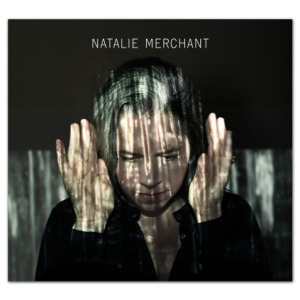
SteveMcCabe.net...
...being the online presence of Steve McCabe himself
On Natalie Merchant, and not finding the joy
July 7th, 2014Natalie Merchant’s self-titled sixth album, her first collection of original material since Motherland, released in 2001, is nice. It’s very nice.
But it’s hard to find a lot to be enthusiastic about. Merchant has, in the past, produced some quite deliciously beautiful music, music with subtle, understated, but unmistakable energy and emotion. But Natalie Merchant contains nothing — and I’ve tried, I’ve really tried, to find the standout track, the classic, the song that fires the spark of joy in my heart that I know Merchant is capable of sparking.
 There are plenty of lovely songs on the album, though —don’t get me wrong. Acoustic whisperers like Seven Deadly Sins and Texas need to be played on a good pair of headphones, and should be listened to in a darkened room, with only candlelight to distract from the accordion and the brushed drums. Black Sheep comes close to excellence, a delicate torch song with swirling oboes and shimmering cymbals, but the saxophone that honks through the background of the song distracts from the moments when Merchant comes close to cutting loose and reminding of what her voice is capable of.
There are plenty of lovely songs on the album, though —don’t get me wrong. Acoustic whisperers like Seven Deadly Sins and Texas need to be played on a good pair of headphones, and should be listened to in a darkened room, with only candlelight to distract from the accordion and the brushed drums. Black Sheep comes close to excellence, a delicate torch song with swirling oboes and shimmering cymbals, but the saxophone that honks through the background of the song distracts from the moments when Merchant comes close to cutting loose and reminding of what her voice is capable of.
And what a voice Merchant has. It is an instrument in itself, a thing of, potentially, the greatest beauty and power. It’s also an instrument she keeps disappointingly muted. A tiny part of me is grateful — I’ve only just forgiven her for what she did to Misguided Angel on the Cowboy Junkies’Trinity Revisited album —but I also miss the sheer, unadulterated joy that she can bring to a song like Jealousy, from 1995’s debut solo album, Tiger Lily. Instead of hip-swaying joy and soaring passion, much of what’s on Natalie Merchant is simply polite.
There are flashes, there are glimpses —Go Down, Moses shows Merchant remembering what her voice is for, what it’s capable of. The song is a fairly simple piece, a gospel shuffle of drums with a little piano and plucked guitars, a sweet scream of Hammond organ, and it offers an ideal backdrop for Merchant to send her voice heavenward, and she does, briefly. Even when backing singer Corliss Stafford steps a little closer to the microphone, Merchant owns the song, and it’s a joy that’s sadly all too rare in this set.
It’s A-Coming is a little bit of a groove, minor-key electric guitars in the background, a hint of funk in the bassline and, again, that hint of Hammond. But it’s an inconsequential number, a throwaway piece, before what Merchant appears to consider the big number for the album.
Lulu is preceded by a ragtime-piano bit titled Lulu (Introduction); the song itself is a very 1980s-inflected slow-burn of a tribute to Louise Brooks. No, I’d not heard of her either — apparently she was famous, as much as anything, for helping to popularise the bob haircut much beloved of her 1920s contemporaries. It remains unclear why Merchant felt the need to eulogise her.
The album ends, not entirely surprisingly, with The End, a song that feels more overwrought than elegant. The string-quartet accompaniment feels overwhelming, overdone — a singer like Merchant needs space to move, she needs room within an arrangement to showcase the dynamics of her voice, and The End fails to give her the space she finds on songs like album opener Ladybird, whose strings accompany and support the sweetness and strength of her voice, but don’t get in the way of it. Even when Merchant is holding back — something you get the feeling she does a lot on this album —there is still a presence to her voice that should be allowed to cut through the music, not fight with it.
There is absolutely nothing wrong with Natalie Merchant. It’s a highly polished, beautifully performed and exquisitely presented album by a mature, accomplished singer and songwriter who has found her own voice, even if she sometimes forgets what to do with it. But for all the beauty of the whispered, close-to-the-mic delicateness, I miss the joy.
Click here to listen to Go Down Moses from Natalie Merchant:
Leave a Reply